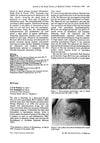 48 citations,
June 2013 in “Journal of Dermatological Science”
48 citations,
June 2013 in “Journal of Dermatological Science” Valproic acid may help hair grow and could be a safe treatment for hair loss.
 47 citations,
December 2002 in “Journal of Neurochemistry”
47 citations,
December 2002 in “Journal of Neurochemistry” Progesterone boosts alcohol's effect on brain, finasteride counters it.
 40 citations,
December 2019 in “Neurobiology of Stress”
40 citations,
December 2019 in “Neurobiology of Stress” Neuroactive steroids show promise for treating mental and neurological disorders by targeting GABA_A receptors.
 35 citations,
August 2004 in “Epilepsy & behavior”
35 citations,
August 2004 in “Epilepsy & behavior” Extended-release divalproex is better tolerated and more effective for seizures and psychiatric symptoms than delayed-release divalproex, but doesn't reduce hair loss.
 34 citations,
April 2014 in “Psychopharmacology”
34 citations,
April 2014 in “Psychopharmacology” Stress and alcohol affect brain chemicals differently in rats, mice, and humans, influenced by genetic differences.
 34 citations,
May 2007 in “Neuroscience”
34 citations,
May 2007 in “Neuroscience” Finasteride reduces alcohol withdrawal severity in male mice but increases it in female mice.
 32 citations,
February 2014 in “Psychopharmacology”
32 citations,
February 2014 in “Psychopharmacology” Dutasteride makes alcohol less sedating and may lead to less drinking in men.
 27 citations,
July 2008 in “Neuroscience”
27 citations,
July 2008 in “Neuroscience” Finasteride given to baby rats causes anxiety-like behavior and worsens learning from punishment in adult rats.
 25 citations,
January 2011 in “Pharmacognosy magazine”
25 citations,
January 2011 in “Pharmacognosy magazine” Nardostachys jatamansi DC compounds help promote hair growth.
 21 citations,
June 2005 in “Alcoholism: Clinical and Experimental Research”
21 citations,
June 2005 in “Alcoholism: Clinical and Experimental Research” Finasteride reduces alcohol withdrawal severity and anxiety in mice, but may increase withdrawal severity in some cases.
 19 citations,
July 2018 in “Medicines”
19 citations,
July 2018 in “Medicines” Juniperus plants contain compounds with potential for developing various medical treatments.
 14 citations,
March 2017 in “Brain research”
14 citations,
March 2017 in “Brain research” Progesterone and its byproducts control a specific receptor in the brain independently of progesterone receptors, affecting conditions related to the menstrual cycle.
 11 citations,
January 2016 in “Bipolar Disorder”
11 citations,
January 2016 in “Bipolar Disorder” Valproate is a mood stabilizer for bipolar disorder but has side effects and risks, especially during pregnancy.
 10 citations,
January 2008 in “Acta dermato-venereologica”
10 citations,
January 2008 in “Acta dermato-venereologica” Carbamazepine caused hair loss and skin eruptions in a woman, which improved after stopping the medication.
 9 citations,
March 2011 in “Clinical and experimental dermatology”
9 citations,
March 2011 in “Clinical and experimental dermatology” The document concludes that anticonvulsants like phenytoin may cause skin reactions by affecting tryptophan metabolism and suggests researching vitamin levels in patients with drug reactions.
 6 citations,
October 2013 in “Expert Review of Dermatology”
6 citations,
October 2013 in “Expert Review of Dermatology” Psychotropic medications can cause skin problems, including serious conditions, and patients should be monitored closely.
 2 citations,
February 1981 in “Journal of the Royal Society of Medicine”
2 citations,
February 1981 in “Journal of the Royal Society of Medicine” A three-year-old girl survived a rare serious infection caused by BCG vaccination, which improved after treatment with a leprosy drug.
 1 citations,
January 2019 in “Elsevier eBooks”
1 citations,
January 2019 in “Elsevier eBooks” Neuroactive steroids may affect the risk and treatment of alcohol use disorders.
 May 2011 in “British Journal of Dermatology”
May 2011 in “British Journal of Dermatology” The 1891 epidemic skin disease was likely caused by arsenic poisoning, possibly from beer or fish.
 506 citations,
January 2012 in “Molecular and Cellular Endocrinology”
506 citations,
January 2012 in “Molecular and Cellular Endocrinology” Melatonin affects many body functions beyond sleep by interacting with specific receptors in various tissues.
 273 citations,
May 2017 in “The Lancet”
273 citations,
May 2017 in “The Lancet” Some drugs can cause rare but potentially deadly skin reactions, and early treatment and avoiding the drug again are key.
 223 citations,
December 2010 in “The Journal of Sexual Medicine”
223 citations,
December 2010 in “The Journal of Sexual Medicine” Some patients taking finasteride or dutasteride may have ongoing sexual problems and depression even after stopping the medication.
 219 citations,
March 2004 in “Journal of The American Academy of Dermatology”
219 citations,
March 2004 in “Journal of The American Academy of Dermatology” 5% and 2% minoxidil solutions effectively promote hair growth and reduce hair loss, with 5% being slightly more effective but having more side effects.
 184 citations,
August 1983 in “The journal of pediatrics/The Journal of pediatrics”
184 citations,
August 1983 in “The journal of pediatrics/The Journal of pediatrics” Biotinidase deficiency has various symptoms and can be treated with biotin supplements.
 183 citations,
January 2018 in “Cosmetics”
183 citations,
January 2018 in “Cosmetics” Essential oils in cosmetics can offer benefits but may cause allergies and should be used carefully.
 179 citations,
September 1998 in “BMJ”
179 citations,
September 1998 in “BMJ” Hair loss in men is common, treatable, but not curable.
 170 citations,
September 2019 in “Evidence-based Complementary and Alternative Medicine”
170 citations,
September 2019 in “Evidence-based Complementary and Alternative Medicine” Some medicinal plants can help heal wounds and may lead to new treatments.
 153 citations,
March 2017 in “Endocrine”
153 citations,
March 2017 in “Endocrine” Male pattern baldness involves genetics, hormones, and needs better treatments.
 150 citations,
October 2010 in “The American Journal of Pathology”
150 citations,
October 2010 in “The American Journal of Pathology” The document concludes that more research is needed to better understand and treat primary cicatricial alopecias, and suggests a possible reclassification based on molecular pathways.
 142 citations,
March 2019 in “Frontiers in Cellular Neuroscience”
142 citations,
March 2019 in “Frontiers in Cellular Neuroscience” The document concludes that adenosine receptor agonists have potential for treating various conditions, but only a few are approved due to challenges like side effects and the need for selective activation.






























